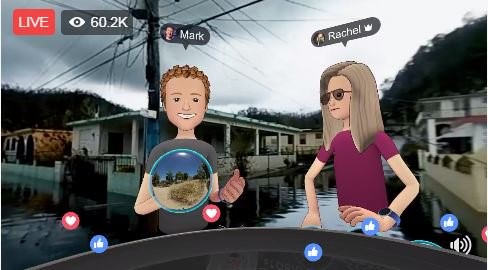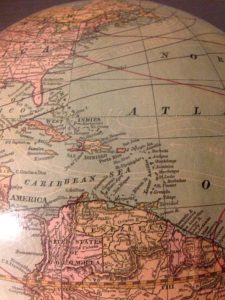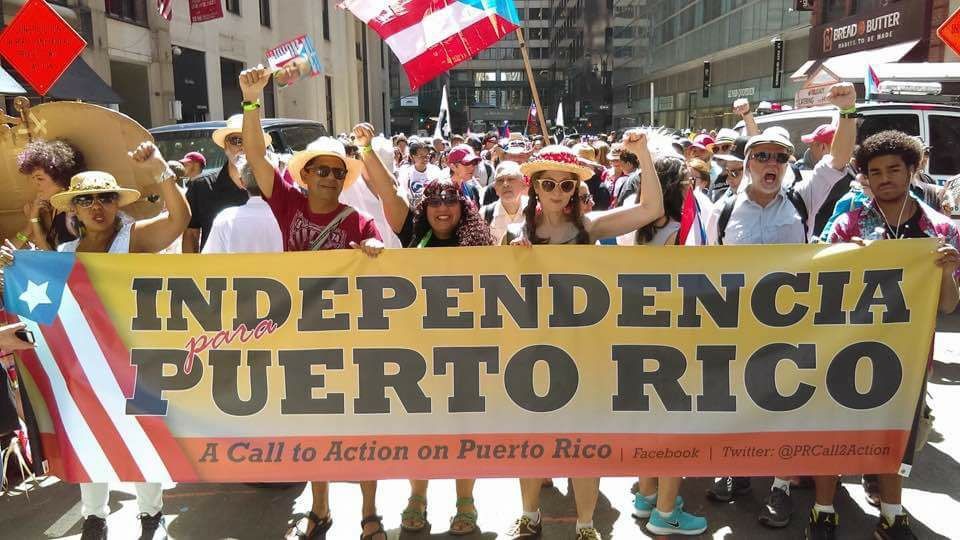The hours, days, weeks, and months following hurricane María have been marked by a deep anxious sorrow for many Puerto Ricans on and off the Caribbean context. For those of us Puerto Ricans in the continental United States (U.S.), and in other parts of the world, there was an overwhelming uncertainty about the wellbeing of our loved ones, the places where many of us grew up, and the spaces in which we built communities. We proceeded to communicate with each other via online platforms.
For this “Digital and Material Rhetorics: Openings for Feminist Action” blog carnival I focus on how decolonial activism occurs in social media networks, specifically in the platform of Facebook. Ironically, though, the creator of such a platform was caught in a wave of criticism because of his insensitive release of a virtual tour of the hurricane-ravaged lands featured as promotion for Facebook Spaces.

While there were those who appreciated Mark Zuckerberg’s virtual tour of Puerto Rico, as reporter Travis Andrews notes, there were many who saw it as another instantiation of the power relations of first world corporations (i.e. Zuckerberg) and their treatment of third world nations (i.e. Puerto Rico as a colony of the United States). Building on transnational feminist rhetoric theories (Dingo; Hesford and Schell; Queen), which pay attention to the U.S. nation-state as a geopolitical entity that subsumes other geographies in neocolonial and imperialist processes, I consider the disaster response by Zuckerberg as a demonstration of the fraught relationship between U.S. corporations and Puerto Rico. Focusing on the subversion of technologies in countering victimization, I analyze how Puerto Ricans have used Facebook to mobilize relief efforts to deal with the effects and affects of hurricane Maria, but also to advocate against austerity measures in an ongoing economic crisis, which exacerbated the devastation of the natural consequences of hurricane Maria. In this opening, I explore how sociomaterial realities are affected and effected in social media writing, and how they are intricately connected in the case of Puerto Rican decolonial efforts throughout global diasporas and in the Caribbean context.
Geographies of Disaster Relief and Decolonial Activism
Though perhaps unintentionally insensitive, Mark Zuckerberg’s virtual tour of Puerto Rico being used to promote Facebook’s virtual reality features an attention to the devastation caused by hurricane Maria. For some, being able to see the places they love was worth ignoring the fact that Zuckerberg intentionally used a disaster to promote a service that would ultimately be profitable for his company. In a move to counter the negative reaction to his untimely virtual tour of Puerto Rico, Zuckerberg wrote a post where he claimed that Facebook teams would be traveling to the archipelago to restore connectivity—though there were no subsequent news on the team’s actual arrival and success. In addition, he pledged $1.5 million to NetHope and the World Food Programme—two organizations that have no direct bearing and effect on Puerto Ricans dealing with the effects of hurricane Maria. By attempting to mask his corporate interest in using the hurricane disaster as marketing ploy, and by pretending to provide aid that would be directed at multinational NGOs unrelated to Puerto Rico, the CEO of Facebook engaged in a kind of faux activism that many of the social networking site users were able to detect. Some of these outspoken critics, such as Universidad Interamericana de Puerto Rico-Law School graduate, Brenda Vázquez-Fuentes used Zuckerberg’s own post to issue a critique, thus subverting the rhetorical goal of his purportedly philanthropist post.
Participation as subversion of a Facebook post’s rhetorical goals provides insights into the activist potential of social networking sites, but the historical and geopolitical histories embedded in such actions should also be carefully considered. In Social Media in Disaster Response: How Experience Architects Can Build for Participation Liza Potts traces participation in online social media as a response to natural disasters and terrorist events. Proposing an actor network theory method of experience architecture, Potts suggests that participants in social web systems can provide scholars and industry experts with better insights on ways to improve these systems. Besides a similar attention to the agency of users of social media that I aim for here, Potts also refers to social web systems as ecosystems, which follows other models of rhetorical ecologies (Edbauer) and ecologies of new media (Brooke). Of course, these are all highly significant contributions to rhetoric and composition understandings of social media networks, including my own. Not only is it useful to think about the concept of ecology as a web of relations in online spaces, it is a useful metaphor to think through the physical aspects involved in these interactions. Because of my attention to geopolitics, in my conception of ecologies I note the material applications of the word to include natural phenomena like hurricanes, or the geographic attributes of the Puerto Rican archipelago—not simply “an island surrounded by water, big water”—as well as the physical distance of many of those who left Puerto Rico due to economic strains imposed by neocolonial relationships of power. Therefore, for the purposes of my thinking of social media use by Puerto Ricans in social web ecosystems, I make note of the political histories that manifest in the digital and material geographies involved in Puerto Rican activism.

Before hurricane María hit Puerto Rico and other U.S. territories in the Caribbean, Puerto Rico had been suffering through austerity measures imposed by PROMESA. The bill signed by President Obama in 2016 was supposed to help the government of Puerto Rico restructure its $70 billion+ debt, one that many (including Senator Bernie Sanders) believe is illegal. Well before this public outcry, there have been decolonial efforts to point to the colonial relationship that caused the issuing of bonds as a last resort for many of the Puerto Rican government leaders before and after the 2006 recession. Briefly here: since the acquisition of Puerto Rico by the United States in 1898, there have been a series of debates about the extension of citizenship rights to Puerto Ricans. Exploitative sugar industries and military posts made the Puerto Rican economy sink even further in the first few decades of the twentieth century. Tax incentives for other U.S. corporations created jobs in exchange for cheap labor and an eventual recession after the removal of such tax incentives, which prompted the urgency for a reliance on predatory loans from Wall Street. After the imposition of PROMESA, a colonial financial control board was meant to resolve the economic crisis, mostly by cutting funding for public education and other vital services. Thus, there has been a growing sense of resistance to this imposition from Puerto Ricans throughout the world, a lot of which uses Facebook to communicate and organize.
Because of the physical geographic distance between Puerto Ricans who have migrated to continental United States like New York, Florida and Washington DC areas, a number of organizations have relied on Facebook to create events and communicate recent news developments around PROMESA proceedings. One of these organizations, A Call to Action on Puerto Rico, openly calls for an independent Puerto Rico. As evident from the group page, their banner identifies Facebook as the first contact information, highlighting the importance of this social network site as organizational platform for decolonial activism. Among some of the pressing concerns that Puerto Ricans in the diaspora attend to through this group are the environmental justice efforts around industrial waste in Peñuelas (a town wherein toxic ash was dumped) through the physical blocking of trucks dumping toxic ash by majority women activists. In addition, they organized protests against defunding public-school systems and energy management, two of the most evident culprits in the ongoing humanitarian crisis after hurricane María.

The group Puerto Rico Maria Updates spurred immediately after hurricane María caused a blackout in communication between Puerto Ricans on the archipelago and those throughout the world. As it happens after other natural disasters, there was a forced interruption between the constant communication between family members and friends of people living in Puerto Rico. This interruption motivated strangers to create a community of people who wanted to know about the conditions of their loved ones in Puerto Rico. Similar to the community that Potts identified immediately following the 2008 Mumbai attacks, there were numerous Puerto Rican participants sharing information they heard, or read, or found in other social media ecologies. For me, the affective dimension of this event included hope, anxiety, anguish, and following Neil Smith’s adage “There’s no Such Thing as a Natural Disaster,” a deep sense of anger at the austerity measures that had caused this blackout. For others, there was an empowering sense of agency in sharing information with others, despite being unable to do anything else to help from a distance.

Whereas numerous Puerto Rican celebrities created events, songs, and fundraising efforts to help Puerto Rico using their mainstream celebrity status, the common Puerto Rican person in the diaspora used the common platforms they engage with in their day-to-day lives. Indeed, Liza Potts notes that it is easier for people to rely on familiar technologies in moments of disaster. In this case, it is also evident that “Social-networking systems support the linkage of people and technologies into fire spaces in which the movement of information is the key affordance supported by the assembled actors. Context emerges from this movement of information” (Potts and Jones 355-356). The context that emerged from the use of Facebook groups was a community of Puerto Ricans in the diaspora helping each other to find out if their loved ones and the places they grew up in had been spared, or how badly they were affected by the storm. Moreover, this community relied on the connection to other existing groups identifying with a Puerto Rican nationality, groups that created decolonial spaces for Puerto Rican activism.
Closing Remarks
There are numerous communities that have emerged post-Maria that are directly addressing the ongoing needs of Puerto Ricans affected by the storm. A lot of them use other communication tools to organize, such as MaestroConference calls, but many of them still use Facebook as the context where information gets disseminated.
After exploring the case of Puerto Rican activism on Facebook, I am more interested in how the online contexts that emerge carry with them emancipatory identities and the values embedded in these ideologies within digital spaces. The work of Angela Hass, Ellen Cushman and Cruz Medina already addresses the decolonial potential of digital platforms. On the other hand, there is a concern about armchair activism, wherein people use social networking sites to voice their political dissent without direct action. More work is needed to understand how spaces in social media are used to organize for political action outside of digital spaces. Is it possible to create communities that are not simply echo chambers? In other words, is membership in a group that shares similar political views useful in expanding such communities? What about the potential for misinformation and unvalidated sources? What about trolling? Should there be a protocol for ethical participation?
In closing, my opening calls for a digital rhetoric understanding of sociomaterial feminist action that is already happening. I suggest we start by addressing the social web and the physical geopolitical ecosystems involved.
Works Cited:
Brooke, Collin Gifford. Lingua fracta: Toward a Rhetoric of New Media. Hampton Pr, 2009.
Dingo, Rebecca A. Networking Arguments: Rhetoric, Transnational Feminism, and Public Policy Writing. Pittsburgh, PA: University of Pittsburgh Press, 2012.
Edbauer, Jenny. “Unframing Models of Public Distribution: From Rhetorical Situation to Rhetorical Ecologies.” Rhetoric Society Quarterly 35.4 (2005): 5-24.
Hesford, Wendy S., and Eileen E. Schell. “Introduction: Configurations of Transnationality: Locating Feminist Rhetorics.” College English 70.5 (2008): 461-470.
Hesford, Wendy S. Spectacular Rhetorics: Human Rights Visions, Recognitions, Feminisms. Durham, NC: Duke University Press, 2011.
Potts, Liza, and Dave Jones. “Contextualizing Experiences: Tracing the Relationships Between People and Technologies in the Social Web.” Journal of Business and Technical Communication 25.3 (2011): 338-358.
Potts, Liza. Social Media in Disaster Response: How Experience Architects Can Build for Participation. Routledge, 2013.
Queen, Mary. “Transnational Feminist Rhetorics in a Digital World.” Walking Talking Feminist Rhetorics: Landmark Essays and Controversies. Ed. Lindal Buchanan and Kathleen J. Ryan. Indiana: Parlor Press, 2010. 201-218.
